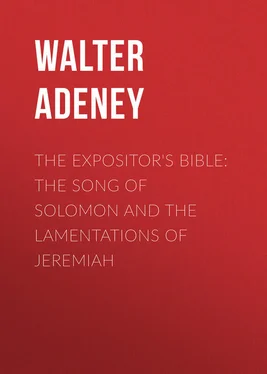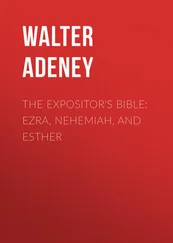Walter Adeney - The Expositor's Bible - The Song of Solomon and the Lamentations of Jeremiah
Здесь есть возможность читать онлайн «Walter Adeney - The Expositor's Bible - The Song of Solomon and the Lamentations of Jeremiah» — ознакомительный отрывок электронной книги совершенно бесплатно, а после прочтения отрывка купить полную версию. В некоторых случаях можно слушать аудио, скачать через торрент в формате fb2 и присутствует краткое содержание. Издательство: Иностранный паблик, Жанр: foreign_religion, foreign_antique, foreign_prose, на английском языке. Описание произведения, (предисловие) а так же отзывы посетителей доступны на портале библиотеки ЛибКат.
- Название:The Expositor's Bible: The Song of Solomon and the Lamentations of Jeremiah
- Автор:
- Издательство:Иностранный паблик
- Жанр:
- Год:неизвестен
- ISBN:нет данных
- Рейтинг книги:3 / 5. Голосов: 1
-
Избранное:Добавить в избранное
- Отзывы:
-
Ваша оценка:
- 60
- 1
- 2
- 3
- 4
- 5
The Expositor's Bible: The Song of Solomon and the Lamentations of Jeremiah: краткое содержание, описание и аннотация
Предлагаем к чтению аннотацию, описание, краткое содержание или предисловие (зависит от того, что написал сам автор книги «The Expositor's Bible: The Song of Solomon and the Lamentations of Jeremiah»). Если вы не нашли необходимую информацию о книге — напишите в комментариях, мы постараемся отыскать её.
The Expositor's Bible: The Song of Solomon and the Lamentations of Jeremiah — читать онлайн ознакомительный отрывок
Ниже представлен текст книги, разбитый по страницам. Система сохранения места последней прочитанной страницы, позволяет с удобством читать онлайн бесплатно книгу «The Expositor's Bible: The Song of Solomon and the Lamentations of Jeremiah», без необходимости каждый раз заново искать на чём Вы остановились. Поставьте закладку, и сможете в любой момент перейти на страницу, на которой закончили чтение.
Интервал:
Закладка:
Returning from the distressing recollection of her dream to the present condition of affairs, the sorrowful Shulammite adjures the daughters of Jerusalem to tell her if they have found her love. 48 48 v. 8.
They respond by asking, what is her beloved more than any other beloved? 49 49 v. 9.
This mocking question of the harem women rouses the Shulammite, and affords an opportunity for descanting on the beauty of her love. 50 50 v. 10-16.
He is both fair and ruddy, the chiefest among ten thousand. For this is what he is like: a head splendid as finest gold; massive, curling, raven locks; eyes like doves by water brooks, and looking as though they had been washed in milk – an elaborate image in which the soft iris and the sparkling light on the pupils suggest the picture of the gentle birds brooding on the bank of a flashing stream, and the pure, healthy eyeballs a thought of the whiteness of milk; cheeks fragrant as spices; lips red as lilies (the blood-red anemones); a body like ivory, with blue veins as of sapphire; legs like marble columns on golden bases. The aspect of him is like great Lebanon, splendid as the far-famed cedars; and when he opens his lips his voice is ravishingly sweet. Yes, he is altogether lovely. Such is her beloved, her dearest one.
The mocking ladies ask their victim where then has this paragon gone? 51 51 vi. 1.
She would have them understand that he has not been so cruel as really to desert her. It was only in her dream that he treated her with such unaccountable fickleness. The plain fact is that he is away at his work on his far-off farm, feeding his flock, and perhaps gathering a posy of flowers for his bride. 52 52 vi. 2.
He is far away, – that sad truth cannot be denied; and yet he is not really lost, for love laughs at time and distance; the poor lonely girl can say still that she is her beloved's and that he is hers. 53 53 vi. 3.
The reappearance of this phrase suggests that it is intended to serve as a sort of refrain. Thus it comes in with admirable fitness to balance the other refrain to which reference has been made earlier. 54 54 Page 20.
In the first refrain the daughters of Jerusalem are besought not to attempt to awaken the Shulammite's love for Solomon; this is well balanced by the refrain in which she declares the constancy of the mutual love that exists between herself and the shepherd.
Now Solomon reappears on the scene, and resumes his laudation of the Shulammite's beauty. 55 55 vi. 4-7.
But there is a marked change in his manner. This most recent capture is quite unlike the sort of girls with whom his harem was stocked from time to time. He had no reverence for any of them; they all considered themselves to be highly honoured by his favour, all adored him with slavish admiration, like that expressed by one of them in the first line of the poem. But he is positively afraid of the Shulammite. She is "terrible as an army with banners." He cannot bear to look at her eyes; he begs her to turn them away from him, for they have overcome him. What is the meaning of this new attitude on the part of the mighty monarch? There is something awful in the simple peasant girl. The purity, the constancy, the cold scorn with which she regards the king, are as humiliating as they are novel in his experience. Yet it is well for him that he is susceptible to their influence. He is greatly injured and corrupted by the manners of a luxurious oriental court. But he is not a seared profligate. The vision of goodness startles him; then there is a better nature in him, and its slumbering powers are partly roused by this unexpected apparition.
We have now reached a very important point in the poem. It is almost impossible to reconcile this with the theory that Solomon is the one and only lover referred to throughout. But on the "shepherd hypothesis" the position is most significant. The value of constancy in love is not only seen in the steadfast character of one who is sorely tempted to yield to other influences; it is also apparent in the effects on a spectator of so uncongenial a nature as king Solomon. Thus the poet brings out the great idea of his work most vividly. He could not have done so more forcibly than by choosing the court of Solomon for the scene of the trial, and shewing the startling effect of the noble virtue of constancy on the king himself.
Here we are face to face with one of the rescuing influences of life, which may be met in various forms. A true woman, an innocent child, a pure man, coming across the path of one who has permitted himself to slide down towards murky depths, arrests his attention with a painful shock of surprise. The result is a revelation to him, in the light of which he discovers, to his horror, how far he has fallen. It is a sort of incarnate conscience warning him of the still lower degradation towards which he is sinking. Perhaps it strikes him as a beacon light, shewing the path up to purity and peace; an angel from heaven sent to help him retrace his steps and return to his better self. Few men are so abandoned as never to be visited by some such gleam from higher regions. To many, alas, it comes but as the temporary rift in the clouds through which for one brief moment the blue sky becomes visible even on a wild and stormy day, soon to be lost in deeper darkness. Happy are they who obey its unexpected message.
The concluding words of the passage which opens with Solomon's praises of the Shulammite present another of the many difficulties with which the poem abounds. Mention is made of Solomon's sixty queens, his eighty concubines, his maidens without number; and then the Shulammite is contrasted with this vast seraglio as "My dove, my undefiled," who is "but one" – "the only one of her mother." 56 56 vi. 8, 9.
Who is speaking here? If this is a continuation of Solomon's speech, as the flow of the verses would suggest, it must mean that the king would set his newest acquisition quite apart from all the ladies of the harem, as his choice and treasured bride. Those who regard Solomon as the lover, think they see here what they call his conversion, that is to say, his turning away from polygamy to monogamy. History knows of no such conversion; and it is hardly likely that a poet of the northern kingdom would go out of his way to whitewash the matrimonial reputation of a sovereign from whom the house of Judah was descended. Besides, the occurrence here represented bears a very dubious character when we consider that all the existing denizens of the harem were to be put aside in favour of a new beauty. It would have been more like a genuine conversion if Solomon had gone back to the love of his youth, and confined his affections to his neglected first wife.
On the shepherd hypothesis it is most natural to attribute the passage to the shepherd himself. But since it is difficult to imagine him present at this scene between Solomon and the Shulammite, it seems that we must fall back on the idealising character of the poem. In this figurative way the true lover expresses his contempt for the monstrous harem at the palace. He is content with his one ewe lamb; nay, she is more to him than all Solomon's bevy of beauties; even these ladies of the court are now constrained to praise the noble qualities of his bride.
Solomon's expression of awe for the terrible purity and constancy of the Shulammite is repeated, 57 57 vi. 10.
and then she tells the story of her capture. 58 58 Vers. 11, 12.
She had gone down to the nut garden to look at the fresh green on the plants, and to see whether the vines were budding and the pomegranates putting forth their lovely scarlet blossoms, when suddenly, and all unawares, she was pounced upon by the king's people and whisked away in one of his chariots. It is a vivid scene, and, like other scenes in this poem, the background of it is the lovely aspect of nature in early spring.
Интервал:
Закладка:
Похожие книги на «The Expositor's Bible: The Song of Solomon and the Lamentations of Jeremiah»
Представляем Вашему вниманию похожие книги на «The Expositor's Bible: The Song of Solomon and the Lamentations of Jeremiah» списком для выбора. Мы отобрали схожую по названию и смыслу литературу в надежде предоставить читателям больше вариантов отыскать новые, интересные, ещё непрочитанные произведения.
Обсуждение, отзывы о книге «The Expositor's Bible: The Song of Solomon and the Lamentations of Jeremiah» и просто собственные мнения читателей. Оставьте ваши комментарии, напишите, что Вы думаете о произведении, его смысле или главных героях. Укажите что конкретно понравилось, а что нет, и почему Вы так считаете.












